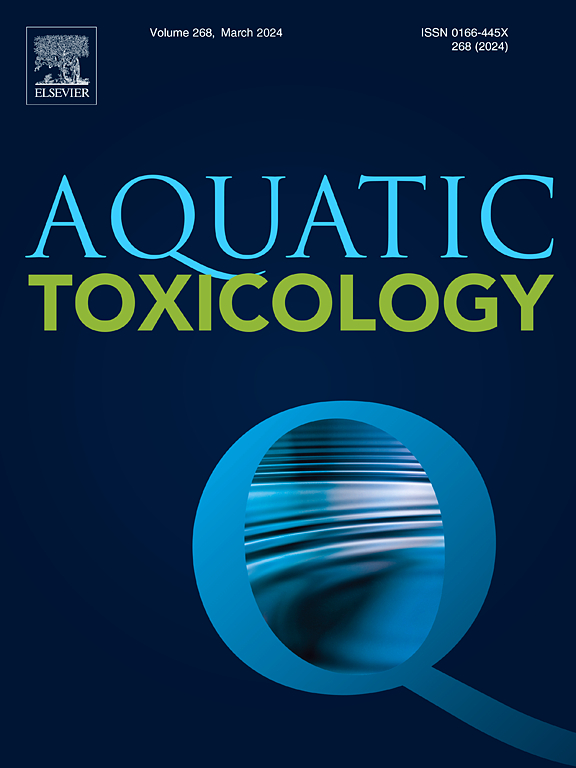Assessment of PFDA toxicity on RTgill-W1 cell line via metabolomics and lipidomics approaches
IF 4.1
2区 环境科学与生态学
Q1 MARINE & FRESHWATER BIOLOGY
引用次数: 0
Abstract
Perfluorodecanoic acid (PFDA), a long-chain perfluoroalkyl substance (PFAS), is known for its environmental persistence and potential toxicity. This study evaluated PFDA toxicity in the RTgill-W1 cell line, a model for aquatic toxicology, using a combination of cell viability assays, reactive oxygen species (ROS) measurements, and high-throughput metabolomics and lipidomics. PFDA exposure resulted in significant, dose-dependent reductions in cell viability and increased ROS production, with an EC₅₀ value of 51.9 ± 1.7 mg/L, highlighting its cytotoxic potential. Metabolomic profiling revealed dose-dependent disruptions in 168 metabolites, impacting pathways related to amino acid metabolism, carbohydrate metabolism, lipid metabolism, vitamin and cofactor metabolism, and nucleotide metabolism. Furthermore, lipidomic analysis identified 102 significantly altered lipids, primary affecting glycerolipid metabolism, fatty acid biosynthesis, glycerophospholipid metabolism, sphingolipid metabolism - suggesting compromised membrane integrity, energy production, and signalling processes. These findings underscore PFDA’s capacity to interfere with critical cellular processes and highlight the utility of integrated omics approaches in elucidating the molecular mechanisms of PFAS toxicity. Future studies should focus on validating fish cell assays through short-term in vivo tests to enhance their reliability and ecological relevance.
通过代谢组学和脂质组学方法评估PFDA对RTgill-W1细胞系的毒性
全氟癸酸(PFDA)是一种长链全氟烷基物质(PFAS),具有环境持久性和潜在毒性。本研究评估了PFDA对RTgill-W1细胞系(水生毒理学模型)的毒性,采用细胞活力测定、活性氧(ROS)测量、高通量代谢组学和脂质组学相结合的方法。PFDA暴露导致细胞活力显着的剂量依赖性降低和ROS产生增加,EC₅0值为51.9±1.7 mg/L,突出了其细胞毒性潜力。代谢组学分析揭示了168种代谢物的剂量依赖性中断,影响与氨基酸代谢、碳水化合物代谢、脂质代谢、维生素和辅助因子代谢以及核苷酸代谢相关的途径。此外,脂质组学分析确定了102种显著改变的脂质,主要影响甘油脂代谢、脂肪酸生物合成、甘油磷脂代谢、鞘脂代谢——表明膜完整性、能量产生和信号传导过程受到损害。这些发现强调了PFDA干扰关键细胞过程的能力,并强调了综合组学方法在阐明PFAS毒性的分子机制方面的实用性。未来的研究应侧重于通过短期体内试验验证鱼类细胞分析,以提高其可靠性和生态相关性。
本文章由计算机程序翻译,如有差异,请以英文原文为准。
求助全文
约1分钟内获得全文
求助全文
来源期刊

Aquatic Toxicology
环境科学-毒理学
CiteScore
7.10
自引率
4.40%
发文量
250
审稿时长
56 days
期刊介绍:
Aquatic Toxicology publishes significant contributions that increase the understanding of the impact of harmful substances (including natural and synthetic chemicals) on aquatic organisms and ecosystems.
Aquatic Toxicology considers both laboratory and field studies with a focus on marine/ freshwater environments. We strive to attract high quality original scientific papers, critical reviews and expert opinion papers in the following areas: Effects of harmful substances on molecular, cellular, sub-organismal, organismal, population, community, and ecosystem level; Toxic Mechanisms; Genetic disturbances, transgenerational effects, behavioral and adaptive responses; Impacts of harmful substances on structure, function of and services provided by aquatic ecosystems; Mixture toxicity assessment; Statistical approaches to predict exposure to and hazards of contaminants
The journal also considers manuscripts in other areas, such as the development of innovative concepts, approaches, and methodologies, which promote the wider application of toxicological datasets to the protection of aquatic environments and inform ecological risk assessments and decision making by relevant authorities.
 求助内容:
求助内容: 应助结果提醒方式:
应助结果提醒方式:


